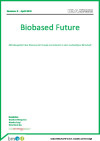Suchergebnisse
New aluminium - sun collector

The development of a new aluminium - sun collector, where the working- fluid completely run through the absorber- area, to reach a higher efficiency.
Strategieprozess Energie 2050
soll zukünftige Erfordernisse für die österreichische Energieforschung definieren.
Produktion der Zukunft Stakeholderdialog "Vom Rohstoff zum Werkstoff"
2. Mai: Vorgestellt wurden Forschungsarbeiten aus der FTI-Initiative "Produktion der Zukunft" zu den Themenfeldern kritische Rohstoffe und innovative Materialien. Die Dokumentation, Präsentationsunterlagen und Fotos sind online.
Energy park Micheldorf-Hirt
Co-operative merging of the energy supply for the Region of Micheldorf within an operating scheme and supply of energy produced through renewable resources. Sustainable, autarkic, economic energy park. Energy supply by renewable resources for the building of the energy autarkic region Micheldorf-Hirt
Energiepark Micheldorf-Hirt
Zusammenschluss der Energieversorgung der Region Micheldorf in einem Betreibermodell und Bereitstellung der Energie durch erneuerbare Ressourcen. Nachhaltiger, autarker, wirtschaftlicher Energiepark. Energiebereitstellung aus erneuerbaren Energieträgern für den Aufbau der energieautarken Region Micheldorf-Hirt
Das Ökologische Passivhaus

Diskussion und Darstellung der Rahmenbedingungen und Komponenten, die die Passivhauskonzeption in Hinblick auf eine nachhaltige Ökologisierung erweitern.
Tecnet Preis 2010
Fabrik der Zukunft Maize Cob Board (MCB) Projekt gewinnt den Tecnet Preis 2010
PROJEKT(T)RAUM_ HAUS_ ZUKUNFT
Wissenstransfer, Kommunikation und Diskussion der Ergebnisse der Programmlinie Haus der Zukunft in den Berufsfeldern Architektur, Planung, Bauausführung und Unternehmen der Bauwirtschaft.
PHOTOVOLTAIK-WATER-Solution
Passivhaussanierung mit fassadenintegrierten Photovoltaik-Modulen zur gleichstrombasierten Warmwasservorerwärmung. Die GIWOG, ein energiebewusster und ökologisch und sozial orientierter Bauherr, beabsichtigt bei der Wohnhausanlage Graz, Liebenauer Hauptstraße 302-306 eine energetischen Modernisierung mit weiteren Optimierungen zu effizienter Energienutzung durchzuführen. Ziel ist den Endenergieverbrauch für Warmwasser und Heizung von derzeit ca. 135 kWh/m²a auf ca. 8 kWh/m²a abzusenken. Durch die geplanten Maßnahmen soll eine Gesamtenergieverbrauchsreduktion von rd. 94 % erreicht werden.
PHOTOVOLTAIC WATER Solution
Passive House refurbishment facade with integrated photovoltaic modules for direct, current-based warm water preheating. The GIWOG, an energy-conscious and environmentally and socially oriented client, intends to undertake an energy-related modernisation project, which will further optimise energy consumption to be more efficient at an apartment complex in Graz, main street 302-306. The goal is to lower the energy consumption for heating and hot water from the current level of approximately 135 kWh /m²a to approximately 8 kWh /m²a. The planned measures should correspond with an overall energy consumption reduction of approx. 94 %.
Mitteilungsblatt "Biobased Future" - Nr. 9, April 2018

Neben Aktivitäten aus den IEA Bioenergy Tasks mit österreichischer Beteiligung werden die Aspekte stofflicher und energetischer Nutzung beleuchtet. Kurze Meldungen, Veranstaltungsrückblicke, Veröffentlichungen und Veranstaltungshinweise runden die Inhalte ab.
Herausgeber: Bioenergy 2020+
Englisch, 36 Seiten
Downloads zur Publikation
Dehnbare, leitfähigen Textilien auf Basis von nano-strukturierten Vorlagen
Entwicklung einer zuverlässigen Technologie zur Herstellung dehnbarer leitfähiger Textilien bei typischen Einsatzbedingungen wie Strecken, Biegen, Waschen, die für weitere Integration von Elektronik in Textilien zur Verfügung steht.
Mission Innovation Champions Award
Entwickeln Sie innovative Energietechnologien? Mission Innovation Champions ist ein neues Programm zur Anerkennung besonderer Leistungen und unterstützt Persönlichkeiten, die die Energiewende vorantreiben! Registrierung bis 26. September 2018
act4.energy veranstaltet 2. Forum in Eisenstadt
27. November 2018
Eisenstadt
Großen Anklang fand das 2. Forum des Stadt der Zukunft Innovationslabors act4.energy, das am 27.11.2018 in Eisenstadt stattfand. Vor Ort diskutierte Michael Paula (BMVIT) gemeinsam mit Landesvertretern und Wirtschaftspartnern die Umsetzung regionaler Energiesysteme.
e-nova 2017: Zukunft der Gebäude. digital - dezentral - ökologisch
23. - 24. November 2017
Pinkafeld
Gebäude und Areale im Fokus, betrachtet die e-nova nachhaltige Technologien aus einem energie- und umweltbezogenem Blickwinkel mit jährlich angepasster Schwerpunktsetzung. Als internationale wissenschaftliche Konferenz konzipiert, richtet sich die e-nova sowohl an die wissenschaftliche Gemeinschaft als auch an berufsfeldorientierte Fachleute.
Vorzeigeregion Energie - 2. Ausschreibung
Das Programm baut auf Ergebnissen des Strategieprozesses „Smart Grids 2.0“ und den Erfahrungen bisheriger in Österreich durchgeführter F&E und Demovorhaben auf nationaler bzw. europäischer Ebene auf. Zielgruppe sind Akteure, die sich mit Forschungs-, Entwicklungs- und Innovationsfragen in Zusammenhang mit der Energiewende befassen. Einreichschluss: 31. Juli 2017
Einfach:wohnen, Phase Errichtung
Unterstützung bei der Errichtung des Demonstrationsvorhabens bestehend aus 7 Wohnhäusern (5 Niedrigenergiehäuser, 1 Passivhaus und 1 Fast -Passivhaus)
Dokumentarfilm "Haus der Zukunft"

Die filmische Begleitung einiger faszinierender Passivhausprojekte aus dem Impulsprogramm "Haus der Zukunft" für 3sat und Bayern Alpha bringt einem breiten Publikum die Relevanz von nachhaltigen Baukonzepten sowie erneuerbaren Energiesystemen näher.
